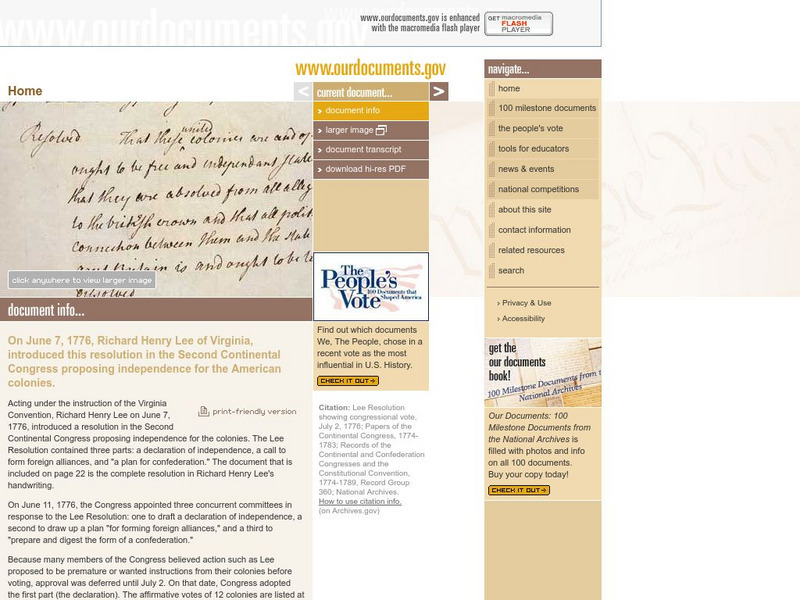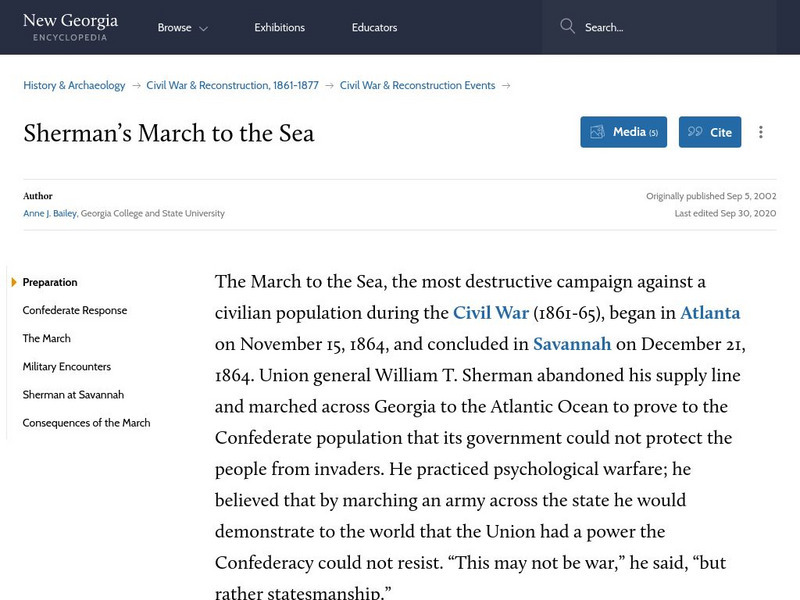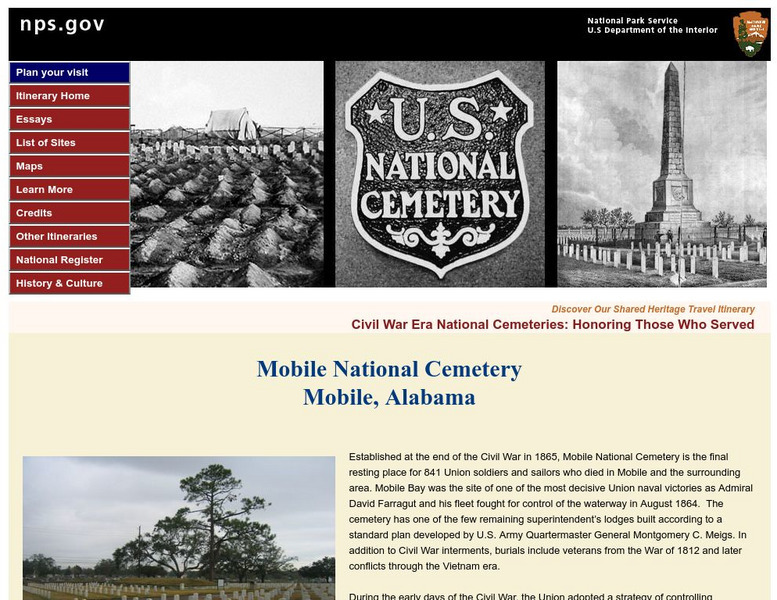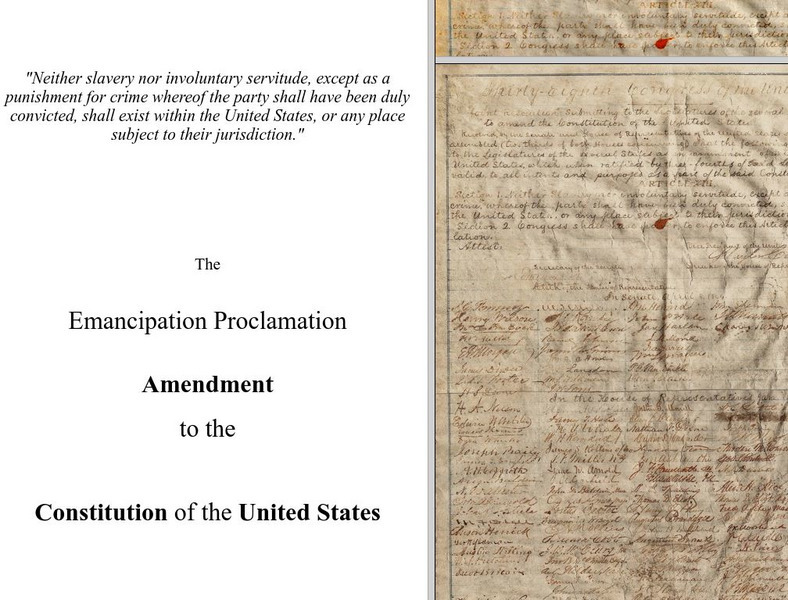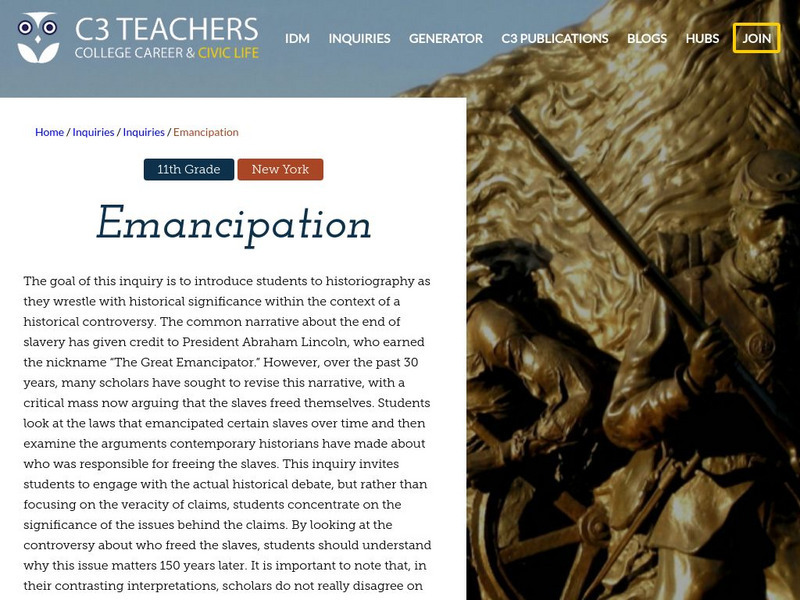Hi, what do you want to do?
US National Archives
Nara: Charters of Freedom: End of Slavery in the United States: 13th Amendment
Online exhibit of primary source documents related to the 13th Amendment after the Civil War and the end to slavery.
National Humanities Center
National Humanities Center: Toolbox Library: The Gilded and the Gritty: America, 1870 1912
Ninety-four primary sources-historical documents, literary texts, and visual images-that explore the challenges, opportunity, and turmoil of late-nineteenth-century America. They examine the economic expansion in an America re-united...
Independence Hall Association
U.s. History: The Emancipation Proclamation
The Emancipation Proclamation in 1863 really didn't free a single slave. Read about why that was true, but also find out why Abraham Lincoln felt is was absolutely necessary to make a stand on ending slavery when he did, and how the...
Other
Texas Beyond History: Texas and the Western Frontier
Read about the expansion of the frontier in and around Texas during the middle of the nineteenth century as the Civil War was coming to an end.
Ducksters
Ducksters: Civil War for Kids: Robert E. Lee Surrenders at Appomattox
Research information about Robert E. Lee's Surrender at Appomattox. Learn how the event that led to the end of the American Civil War.
PBS
Pbs: The Conquistadors: Beginning of the End of the Inca Empire
A look at the Inca Empire as rumors began to fly about pale strangers arriving on the coast. Read about the illnesses and civil wars that weakened the empire just in time for the appearance of the conquistadors. Be sure to click on the...
US National Archives
Our Documents: Emancipation Proclamation (1863)
Image of handwritten copy of Lincoln's Emancipation Proclamation, accompanied by an explanation of the speech's purpose, impact, and role in American history.
Ibis Communications
Eye Witness to History: Surrender at Appomattox, 1865
This article describes the events leading up to the surrender of the South and the surrender itself. Includes communication between Grant and Lee leading to their meeting at Appomattox.
Independence Hall Association
U.s. History: The Road to Appomattox
Robert E. Lee's Army of Northern Virginia, the primary fighting force of the Confederacy, was vastly reduced as a result of the nine-month siege of Petersburg. Read about how Lee escaped. only to be surrounded at Appomattox Courthouse...
Georgia Humanities Council and the University of Georgia Press.
New Georgia Encyclopedia: Sherman's March to the Sea
Encyclopedia article describing General William Sherman's "March to the Sea" across Georgia that started in Atlanta and ended in Savannah.
Curated OER
National Park Service: Appomattox Campaign
Read about the final battles at Appomattox which ended on April 9, 1865 with Lee's surrender at the Court House. This site is part of the website for the Appomattox Court House National Historic Park.
PBS
Pbs Learning Media: The Fourteenth Amendment Part Ii
In this video segment from The Supreme Court, learn about the 1883 Supreme Court decision that marked the end of federal protections for individuals in states and the beginning of Jim Crow segregation.
Siteseen
Siteseen: American Historama: Racial Segregation History in the United States
This article contains numerous facts about black segregation history in the United States from the Civil War through the end of the Civil Rights Movement.
Curated OER
National Park Service: Mobile National Cemetery, Mobile, Alabama
The U. S. National Cemetery in Mobile, Alabama is the resting place of more than 800 Union soldiers who died in the Mobile area toward the end of the Civil War. Military dead from other conflicts, through the Vietnam War, are also buried...
Other
Chickasaw History
Learn about the history of the Chickasaw from pre-contact time up to the 20th century. Describes in detail their interactions with Europeans throughout the 18th and 19th centuries, including their role in supporting the Confederacy...
US Army Center
U.s. Army Center of Military History: Winfield Scott
From the book, "Commanding Generals and Chiefs of Staff," by William Gardner Bell, this brief biography of Winfield Scott lists the dates of his many military accomplishments, including his successful capture of Mexico City, ending the...
US National Archives
Docsteach: How Effective Were the Efforts of the Freedmen's Bureau?
In this activity, students will analyze documents from the War Department's Bureau of Refugees, Freedmen, and Abandoned Lands - better known as the Freedmen's Bureau - that Congress established on March 3, 1865, as the Civil War was...
Other
Karpeles: Emancipation Proclamation Amendment to the Constitution
A copy and transcription of the 13th Amendment which ended slavery. The sidebar gives a brief overview of emancipation and what led to this amendment.
National Humanities Center
National Humanities Center: Teacher Serve: The Demise of Slavery
In this essay, J. William Harris, Professor of History at the University of New Hampshire, explains the developments that brought about the demise of slavery.
University of Groningen
American History: Outlines: The Era of Expansion and Reform
This resource, a speech by Woodrow Wilson to Congress on April 8, 1913, gives a great review of how the United States transformed from from a rural country to an urban one. It includes a review of industrialization, new inventions,...
Curated OER
Etc: Maps Etc: The Civil War in the United States, 1861
A map of the southeastern States showing the Federal and Confederate territories at the end of 1861. The railroad network shown is based on 1860 lines. The map shows major cities, mountain systems, rivers, and coastal features of the area.
Other
Bringing History Home: Segregation History
This 3rd grade unit introduces children to the history of segregation, from the end of the Civil War in 1865 through the 1940s. Its content bridges the period between slavery and the peak of the Civil Rights movement in the 1950s and...
C3 Teachers
C3 Teachers: Inquiries: Emancipation
A learning module on the emancipation of African American slaves after the Civil War. It includes several supporting questions accompanied by formative tasks and source materials, followed by a summative performance task. Students will...
Tom Richey
Tom Richey: The Rise of the Romans: C. 264 27 b.c.
Learning module creted by Tom Richey, with videos, lesson guides and primary resources from which students learn about the rise of the Romans from the beginning of the Republic through the end of the Roman Civil Wars. Topics include the...










